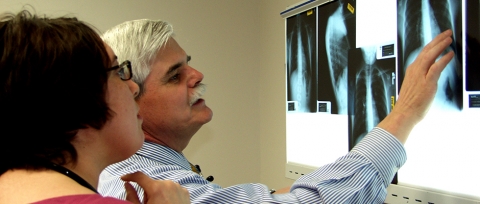Pulmonology, Allergy and Immunology

In Arizona we have nearly twice the national average of kids with asthma. Pediatricians at the UArizona Steele Children's Research Center and the Arizona Respiratory Sciences Center are studying how genes determine a patient's response to asthma treatment.
The conventional therapy for children with severe asthma usually is a form of abuterol in an aerosolized form. Unfortunately, some children do not respond well to this type of treatment, which may put them at higher risk for acute asthma attacks. UArizona researchers have demonstrated that the receptors in a child's lung that trigger the bronchi to dilate vary according to the genetic makeup of the child. Knowing which child will respond to which treatment before an asthma attack could mean improved treatment for children with asthma the world over.
The Pulmonology, Allergy and Immunology division of the UA Department of Pediatrics has been named a Pediatric Pulmonary Center (PPC) by the Program of the Maternal and Child Health Bureau. We are the first and only center of this type in the western U.S. (including Arizona, California, Nevada, and Hawaii). The PPC designation means that our pediatric pulmonologists will be training medical professionals from all the states in the region on improved therapies for children with chronic lung disease. Led by Wayne Morgan, MD, the PPC will mean enhanced care for thousands of children with asthma, cystic fibrosis and bronchiolopulmonary dysplasia (BPD).
Mark Brown, MD, pediatric pulmonologist, is studying how the immune systems of mother and baby interact during pregnancy to better understand the development of the child's immune system. During pregnancy, a woman's immune system adjusts to promote the development of the fetus. Generally the immune system reacts to foreign material (in this case the baby, but usually bacteria or virus) with an infection fighting response. During pregnancy the mother's body develops an allergic response to the baby, which allows the baby to develop normally. Mothers with allergies develop a stronger allergic response to the baby than mothers without allergies. This may influence the baby's immune development and put him/her at greater risk for asthma and allergies. If so, finding ways to modify the mother's response may reduce that risk.





